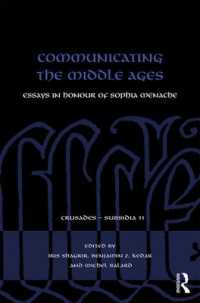- ホーム
- > 洋書
- > 英文書
- > Religion / Ethics
Full Description
In the study of American law, originalism is primarily a theory about the meaning of the Constitution—that its meaning can only change when its words change. Originalism also appears in biblical theology as a theory on the meaning of the Bible—that its meaning is that intended by the original authors. Originalism in Theology and Law: Comparing Perspectives on the Bible and the Constitution offers a study of originalism in both the Bible and the Constitution. While there are significant connections between originalism as a theory of biblical interpretation and as Constitutional interpretation, there are also differences in the type of text as well as its purpose, function, origins, or authority, which may affect which nuanced version of originalism best fits a particular text, or the best method of interpreting it.
Contents
Introduction: Two Originalisms, Mark J. Boone
Chapter 1: Originalism: First Theology, First Things, Mark Eckel
Chapter 2: Reading Pictures: Comparing Aesthetic and Hermeneutic Discussions of Intention, Jonathan Johnson
Chapter 3: The Torah Is Not in Heaven: Living Originalism and Political Integrity in the Oven of Akhnai, Daniel Weissglass
Chapter 4: Sacred Scripture, Sacred Constitution: Individual Religious Hermeneutics and Constitutional Interpretation, Nicholas Higgins and Micah Allred
Chapter 5: Originalism and Judicial Restraint: Lessons from the Lutheran Reformation, John Ehrett
Chapter 6: The Originalist Hermeneutic in Biblical and Constitutional Context: Comparing and Contrasting the Notion of Originalism in Two Very Different Fields, Mark A. Snoeberger
Chapter 7: Originalism and the Sources of Authority, Mark J. Boone
Chapter 8: A Difference Between Biblical and Constitutional Originalism, Menashe C. Roberts
Chapter 9: First Theology and Last Things, Mark Eckel
About the Authors








